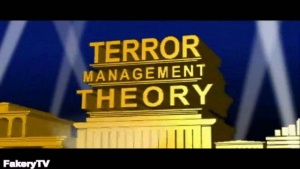Difference between revisions of "Terror management theory"
Jump to navigation
Jump to search
(Created page with "{{group |WP=https://en.wikipedia.org/wiki/Terror_management_theory |constitutes= |description=The academic study of the fear of death. }} '''Terror management theory''' is the...") |
|||
| Line 1: | Line 1: | ||
{{group | {{group | ||
|WP=https://en.wikipedia.org/wiki/Terror_management_theory | |WP=https://en.wikipedia.org/wiki/Terror_management_theory | ||
| + | |image=Terror management theory.jpg | ||
|constitutes= | |constitutes= | ||
|description=The academic study of the fear of death. | |description=The academic study of the fear of death. | ||
Revision as of 16:26, 8 July 2016
 | |
| The academic study of the fear of death. |
Terror management theory is the psychological theory about how humans deal with fear of death. Systematic research on this in the 1970s began to confirm that even subliminal reminders of mortality can have a huge effect on people, motivating them to become not only more fearful, but xenophobic and submissive to authorities. This explains why, for example, the popularity of George W. Bush leaped after September 11th, in spite of his demonstrably underwhelming performance (reading a story about a pet goat to a class of Florida first graders, even after he is told about the terrorist attacks underway in New York).
Official narrative
Terrorists≠Terrorists...
Many thanks to our Patrons who cover ~2/3 of our hosting bill. Please join them if you can.